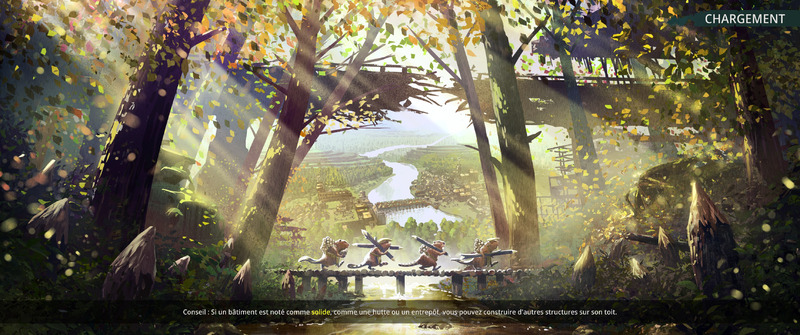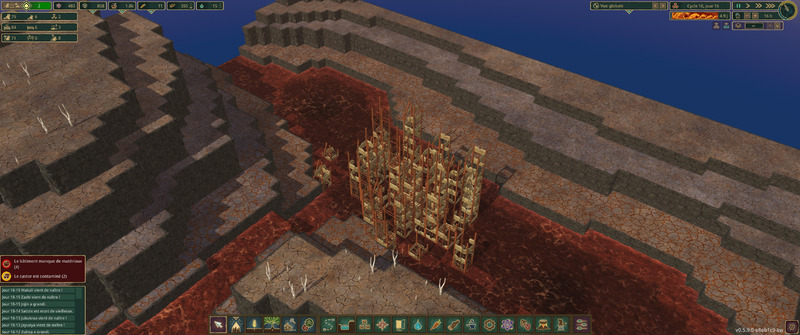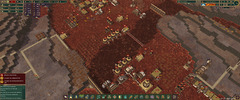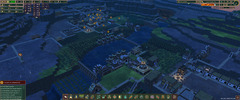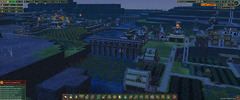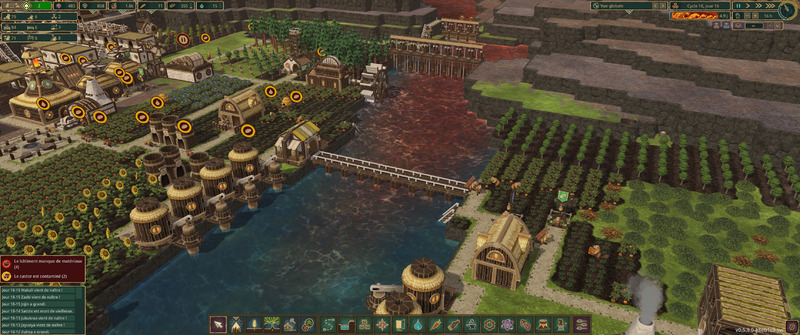Yeah. Good.
But actually yeah, who can rebuild and repopulate our Mother Earth better than the beaver? Diligent and constructive race (she), large teeth for tools and a long tail for work, normal that she is now at the height of Darwinism. But it's not going to happen without you, so hey, ultimately, it's still the human who has it (the hand) (you have it).
The game has therefore been in early access since September 2021 – two and a half years, we are within the usual framework – and is very clean, very square: the interface is stylish and functional, the graphics are cute and pretty, you can zoom in with increased perception of sounds and the devs have chosen to offer cards with somewhat cubic shapes, with edges, rather than too realistic; we are not in Minecraft be careful, but the relief is very rough.
Advertisement
During the EA, you can choose two races, the second is only unlocked after having progressed a little with the first and provides specific buildings; a proposition that we already find on a few titles, including the very nice The Universim recently released after 10 years of development. Several cards of several sizes are offered on the menu, allowing you to expand and showcase your talent as an architect and water engineer. Because, yes, the real strength of the title is its fluid mechanics.
The cards and their sizes are reminiscent of RTS from the 90s-2000s and it is certainly not trivial; I don't know if the title will ultimately include a campaign and a story (nothing like that on the Steam page), but it made me think back to the good old days of Age of. So you choose the one you want, some include a quick tutorial (the green leaf on the in-game miniature) and off you go to fool around for long hours carving clubs.
The basic principle is simple: like the RTS of yesteryear, in isometric view, you start with a base and a handful of beavers; you have to unlock buildings, from culture to engineering through the collection of resources, it's up to you to take possession of the Wasteland by developing and multiplying, amen. But beware. If you start on an oasis, generally on the edge of a cool crystal blue river, this will quickly not be the case just a few cables from your location. Sewer outlets and ruins of buildings litter your environment, sinister witnesses of a bygone and rusty past. And polluting, in his spare time. We are not in a Horizon Zero Dawn nor one falloutthe postapo leg remains light, but these remains will know how to serve your interests when the time comes.
The most interesting element of the title, which makes it unique, is its ability to play with fluids. As a child, did you love creating dams, diverting rivers or drains, flooding your neighbor's cellar or their land? No ? However, I would have thought that, like me… well, in short, this will be necessary for you in Timberborn. The river follows its course, but it will initially be up to you to skilfully exploit it, particularly via tidal force, then towards the end of the game to reshape it, divert it, or even completely redesign it according to your needs. particularly in crops. Or just to mess around.
Advertisement
Do you remember Jacquouille? Day-Night-Day-Night? You will be like him when you have installed your first functional lock on either side of the two banks and, as fascinated as when you gassed these anthills (no more? ah, however…) you will observe the water rises, then overflows and flows depending on the relief or your excavations. Really quite fun to implement, especially if you love it when your plan goes smoothly. But I assure you, even if it messes up and floods everything, it's great too. And then we reload our game, don't mess around. And wait until you see the gears!
The difficulty of the game lies in the balance of all these forces: on the one hand, you have the beavers, a particularly fertile and industrious race which does not hesitate to wet the jersey, on the other nature which will sometimes come into play of you with certain repeated events aimed at putting you in difficulty, well yes, all the same; you will therefore have periods of drought likely to ruin your crops and your nurseries (very quickly you must plant your own trees, the initial survivors will not last long) or worse to make your population thirsty; and you will have periods where, like after gastrointestinal, the sewers back up and you will have to be careful that it is not in your face, unlike your partner when they wake up in the morning.
Here again, it's up to you to use wisely all the tools that the game offers you to contain or even dominate the waters, both in their overflows and in their losses.
To support you in all this, you will have a very complete management window, which allows the real-time census of your beavers, assets, buildings, states etc. The tool is powerful, it could be more expressive and functional, but it is probably in its final form.
The game also allows, in the castoroid spirit, to play with verticality; whether it is to take over the cliffs using the stairs or your storage or housing towers, be sure of one thing: none of your games will resemble another and on the same map, no one will have the same development as you, both in terms of town planning and operation. And that's where the richness of the title lies in the end, a lot of fun, novelty and crazy replayability.
A final word on the music: it will accompany you during your adventures if you appreciate instruments such as the piano which at first glance have little to do with either the theme or the events of the game. As a result, a rare occurrence For me, I ended up cutting it.
Some limitations
For my part and as it stands, I already really appreciate the game, especially after the recent “Badwater” update which added this management of exogenous wastewater (you don't create any yourself, not there where I got to anyway). I am nevertheless doubtful about two elements which currently upset me a little; I certainly haven't mastered all the mechanics of the game, but the choice of game design still raises questions for me. First point, simple management. Unlike an RTS or usual management game ( Age of has Anno Passing by The Settlers) in which to place a production/harvest building allows the allocated population to manage fluidly and directly, here it is specifically necessary to place a harvesting tool (to pick, to cut, to dismantle) which manages a very wide area of effect, but then, in addition, we must define in this area of effect what we want to cut in the case of wood. This seems to me to be very artificial mechanics, especially after the fluidity of popular titles that have been discussed for decades.
The other point is the capacity for expansion. You are not managing a single city center, you will be required to expand and install others. But they don't push your boundaries, because there really aren't any; only, the further you go from the center, the more time routing and construction will take (honestly I haven't seen absolutely any difference, but I play at maximum speed all the time). So theoretically, to optimize, you will need new city centers which in turn become a new base to manage with all the redundancy that this implies. A redundancy which does not go as far as total duplication, because as soon as your science points allow you to do so, you will be able to set up “trade zones”, a sort of customs which will allow you to import/export the goods and resources of 'one “district” (that's the name of the city centers) to another. Before this stage, there will be a bottleneck, sometimes fatal. Once again, this rather restrictive mechanism (on my part, it is far from functional even though I have configured everything correctly) makes me wonder if ultimately, it is not an artificial way to extend the lifespan of the game and to characterize it other than as “a management game with the fleet and beavers so that's a bit tight”. To do with the rest of the development (as well as the planned additions) and of course the experience.
I will end by adding that in addition to these two points, the ergonomics sometimes proves clumsy: no way to select several buildings in the field (unless I am mistaken), the management of priorities of the tasks to be carried out/buildings to be managed can get confused, the camera view is a little too flat when you play with it. Nothing serious though.
Timberborn, developed since 2018, has been available in early access on Steam since the end of 2021, with “extremely positive” reviews to date; it is fully and correctly translated into French and for €24.50.
Overview delivered by THX using a key provided by the developer.
